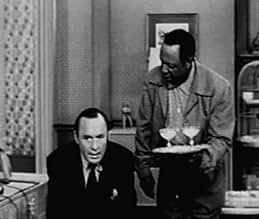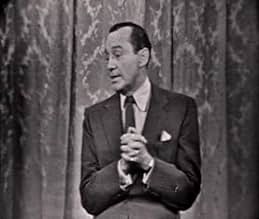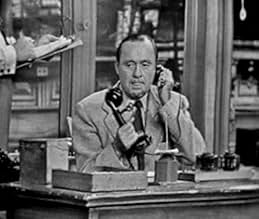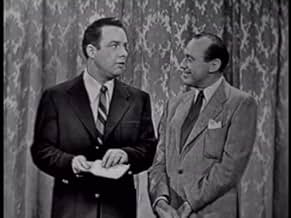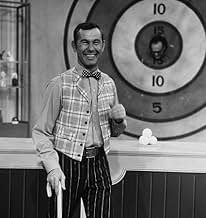AVALIAÇÃO DA IMDb
8,5/10
1,7 mil
SUA AVALIAÇÃO
Adicionar um enredo no seu idiomaThe comic misadventures of the "skinflint" comedian and his friends.The comic misadventures of the "skinflint" comedian and his friends.The comic misadventures of the "skinflint" comedian and his friends.
- Ganhou 7 Primetime Emmys
- 8 vitórias e 14 indicações no total
Explorar episódios
Avaliações em destaque
Jack Benny was unique among the great comedians this country has produced. Only his comedy was not the product of gags or situations, though he used them. His comedy arose out of an indelible character he created, the lovable tightwad who came into our homes via radio and television for over 30 years.
In real life Jack Benny was not a tightwad, in fact he was a generous man whose charitable giving was known if not publicized. That of course would have ruined the image and the image was the linchpin of his comedy.
Because we knew his character so well, the cheap gags followed. They would mean nothing to anyone else, but because it was Benny we laughed at a burglar saying your money or your life and Benny stalling with a reply of I'm thinking. The sounds of his Maxwell car were second nature, they brought laughs because Benny was too cheap to buy a new car. And his Social Security number, 000-00-0001 in deference to his age.
The Jack Benny Show took us inside the pretend world of tightwad Jack Benny. His announcer Don Wilson, real life wife Mary Livingston, butler Eddie 'Rochester' Anderson, and the perpetual adolescent with the piping tenor Dennis Day all were part of that world. On radio Phil Harris as the brash band-leader was there, but he didn't make it to television, deciding to strike out on his own. All of these people bounced gags off Benny's tightwad character and all got generous laughs at his expense. But the laughs were coming for Benny's character, not necessarily out of anything he said necessarily.
Some his shows were classics and allowed people to really enjoy themselves. One of my favorites had Raymond Burr as a guest star who did courtroom sketch and broke into a song and dance before the jury. Burr looked like he was having a great time. Another show I remember had long time show business friends Bing Crosby and George Burns as guests, reminiscing about back in the days when the three of them were a vaudeville trio act.
His shows were welcome in millions of American homes including mine. Would that another Jack Benny would come on the scene today.
In real life Jack Benny was not a tightwad, in fact he was a generous man whose charitable giving was known if not publicized. That of course would have ruined the image and the image was the linchpin of his comedy.
Because we knew his character so well, the cheap gags followed. They would mean nothing to anyone else, but because it was Benny we laughed at a burglar saying your money or your life and Benny stalling with a reply of I'm thinking. The sounds of his Maxwell car were second nature, they brought laughs because Benny was too cheap to buy a new car. And his Social Security number, 000-00-0001 in deference to his age.
The Jack Benny Show took us inside the pretend world of tightwad Jack Benny. His announcer Don Wilson, real life wife Mary Livingston, butler Eddie 'Rochester' Anderson, and the perpetual adolescent with the piping tenor Dennis Day all were part of that world. On radio Phil Harris as the brash band-leader was there, but he didn't make it to television, deciding to strike out on his own. All of these people bounced gags off Benny's tightwad character and all got generous laughs at his expense. But the laughs were coming for Benny's character, not necessarily out of anything he said necessarily.
Some his shows were classics and allowed people to really enjoy themselves. One of my favorites had Raymond Burr as a guest star who did courtroom sketch and broke into a song and dance before the jury. Burr looked like he was having a great time. Another show I remember had long time show business friends Bing Crosby and George Burns as guests, reminiscing about back in the days when the three of them were a vaudeville trio act.
His shows were welcome in millions of American homes including mine. Would that another Jack Benny would come on the scene today.
I just finished watching an hour-long JACK BENNY SHOW from 1965 with perhaps the best guests ever assembled: Bob Hope, Elke Sommer, The Beach Boys (introducing some now very classic songs), and Walt Disney! The first skit was a parody of popular shows of that era (The Munsters, The Addams Family, Bewitched, My Mother the Car, The Fugitive, and Peyton Place), but the best skit was an Italian film style version of Mary Poppins with Elke Sommer in the title role, Bob Hope as a chauffeur, and Jack Benny as the father. There is also a great skit with Benny visiting Disney's office asking for free tickets to Disneyland for 110 guests. Lots of music from the Beach Boys and Elke Sommer (who manages to steal every scene, even up against Hope and Benny!). If you find this at an on-line auction somewhere (that's how I found it) it is well worth the investment. A classic the entire family will love.
I think one reason Benny is so beloved by fans is that he comes across as a genuinely likable guy beneath all the funnyman routines. Unlike many comedians, there's nothing of the "smart Alec" or "wise guy" about him. Not that these are disqualifying traits—Bob Hope, for one, made an immensely successful career as a wise guy. But the thing with Benny is that no matter how vain or cheap he appeared in his stage act, there was always an air of underlying likability. So when he tipped the sweating waiter a nickel or preened as the world's best comedian, fans laughed and forgave him.
Consider that his show lasted an amazing 15 years on a medium with a reputation for devouring funnymen. Much of that success is due to a cast of well-honed regulars that the writers skillfully blended into the program whether live or on film. Basically, we knew what to expect from each—a wise-cracking Rochester, a jovial Don Wilson, a sensible Mary Livingstone, a dazed Dennis Day, and, of course, Jack's two perennial nemeses Mel Blanc and Frank Nelson. The latter two furnished many of the petty annoyances that were the basis of much of Jack's comedic schtick. Speaking of style, it also looks like Jack was mainly a "reactive" comedian— that is, his humor grew out of exasperated, low-key reactions to life's many petty annoyances, which were also ones the audience could relate to.
My favorite routines were the spoofs of popular movies, like Gaslight or Dr. Jekyll and Mr. Hyde. It was the latter, I believe, where dressed up as the fearsome Hyde, Benny attacks this feeble old lady who, nevertheless, proceeds to flip him in six different directions before he slinks away, a totally defeated Hyde. I don't know how they did it, but the contrasting appearances and unexpected outcome were hilarious.
I doubt the show would succeed with today's hyper-energized audiences, where much of the humor is more obvious and more over-the-top. Jack's era was, of course, a period of tight restrictions on what could be said or shown. But his show under-played that tight framework like a virtuoso, week-in and week-out. I guess these few words amount to my little appreciation of a program that gave me so many pleasurable moments. So, the time spent trying to think this out is time well spent. Thanks, Mr. Benny. In my book, you are an enduring classic.
Consider that his show lasted an amazing 15 years on a medium with a reputation for devouring funnymen. Much of that success is due to a cast of well-honed regulars that the writers skillfully blended into the program whether live or on film. Basically, we knew what to expect from each—a wise-cracking Rochester, a jovial Don Wilson, a sensible Mary Livingstone, a dazed Dennis Day, and, of course, Jack's two perennial nemeses Mel Blanc and Frank Nelson. The latter two furnished many of the petty annoyances that were the basis of much of Jack's comedic schtick. Speaking of style, it also looks like Jack was mainly a "reactive" comedian— that is, his humor grew out of exasperated, low-key reactions to life's many petty annoyances, which were also ones the audience could relate to.
My favorite routines were the spoofs of popular movies, like Gaslight or Dr. Jekyll and Mr. Hyde. It was the latter, I believe, where dressed up as the fearsome Hyde, Benny attacks this feeble old lady who, nevertheless, proceeds to flip him in six different directions before he slinks away, a totally defeated Hyde. I don't know how they did it, but the contrasting appearances and unexpected outcome were hilarious.
I doubt the show would succeed with today's hyper-energized audiences, where much of the humor is more obvious and more over-the-top. Jack's era was, of course, a period of tight restrictions on what could be said or shown. But his show under-played that tight framework like a virtuoso, week-in and week-out. I guess these few words amount to my little appreciation of a program that gave me so many pleasurable moments. So, the time spent trying to think this out is time well spent. Thanks, Mr. Benny. In my book, you are an enduring classic.
In the early 1960's TV Guide critic Cleveland Amory started his review of "The Jack Benny Program" with "There are two kinds of jokes. Regular jokes and Jack Benny jokes." Regular jokes hit you, if you are lucky, only once. Jack Benny jokes hit you, if you are lucky, over and over. What Cleveland Amory at the time was referring to was the way a joke that popped up in the beginning of any given Jack Benny program episode was not an end in itself but a set-up for two, three, or four jokes that would emerge throughout he show.
Some time before I was born, Jack Benny started to use, but never milked, familiar masks: his awful violin playing, his stingy nature, his offense at being insulted by his patented pause followed with, "Well!", his insistence that he was thirty nine years old, and his recurring attempts to get a renowned musician to play his pitiful song, "When the Swallows Come Back to Capistrano".
"Hello, Police Department? I want to report a lost wallet. It is brown leather. Inside there are three one dollar bills. And the serial numbers are......" Inside a sauna: "Gee. I haven't sweated this much since they closed the banks in 1934."
As Jack Benny delighted in telling later in life, sometimes the stories behind the jokes were even more funny than the jokes themselves. Jack would work with the writers in mid-week before any given show. As Jack told it, one week one of the writers thought up the scenario, "Jack is walking down the street and a thug comes up to him with a pistol and demands, 'Your money or your life!'" All readily agreed that that was a good premise for a joke. "But how is Jack going to respond?" All in the room were puzzled and when one writer got impatient by calling out, "Well?", Jack, still stumped for a good punch line, snapped back, "I'm thinking it over!" When the other writers started laughing, Jack asked, "What's so funny?" It took Jack Benny a few moments to get it that he had just invented the best joke of his career.
That Jack will forever be remembered as being forever thirty nine years old is now not a joke but an inspiration for us his fans and survivors to hold on to youth and humor for as long as he did.
Some time before I was born, Jack Benny started to use, but never milked, familiar masks: his awful violin playing, his stingy nature, his offense at being insulted by his patented pause followed with, "Well!", his insistence that he was thirty nine years old, and his recurring attempts to get a renowned musician to play his pitiful song, "When the Swallows Come Back to Capistrano".
"Hello, Police Department? I want to report a lost wallet. It is brown leather. Inside there are three one dollar bills. And the serial numbers are......" Inside a sauna: "Gee. I haven't sweated this much since they closed the banks in 1934."
As Jack Benny delighted in telling later in life, sometimes the stories behind the jokes were even more funny than the jokes themselves. Jack would work with the writers in mid-week before any given show. As Jack told it, one week one of the writers thought up the scenario, "Jack is walking down the street and a thug comes up to him with a pistol and demands, 'Your money or your life!'" All readily agreed that that was a good premise for a joke. "But how is Jack going to respond?" All in the room were puzzled and when one writer got impatient by calling out, "Well?", Jack, still stumped for a good punch line, snapped back, "I'm thinking it over!" When the other writers started laughing, Jack asked, "What's so funny?" It took Jack Benny a few moments to get it that he had just invented the best joke of his career.
That Jack will forever be remembered as being forever thirty nine years old is now not a joke but an inspiration for us his fans and survivors to hold on to youth and humor for as long as he did.
I loved The Jack Benny Show. I am so shocked that there were only two comments in your index about it. Yes some of the episodes are almost fifty years old and probably will never see the light of day again, but look at the dreck on tv right now. This show would be just as good as ever. Jack was such a wonderful comic because he always took it so seriously. He didn't even realize how funny he was I don't think. George Burns once said Jack was funniest when he wasn't saying anything. I loved everything about the show and would love to see it again.
Você sabia?
- CuriosidadesMost of Jack Benny's original radio cast appeared on television with him, including Don Wilson, Eddie 'Rochester' Anderson, Dennis Day, and his real-life wife Mary Livingstone made several guest appearances. In one episode, Jack dreamed that he and Mary (his platonic friend on the show) were married and had a teenage daughter. Their daughter was played by their real daughter, Joan Benny.
- Erros de gravaçãoWhen the show was originally broadcast live, the program introduction was "From Television City in Hollywood..." CBS Television City is in the Fairfax District of Los Angeles, not in Hollywood.
- Citações
Marilyn Monroe: What about the difference in our ages?
Jack: Oh, it's not that big a difference. You're twenty-five and I'm thirty-nine.
Marilyn Monroe: I know, Jack. But what about twenty-five years from now when I'm fifty and you're thirty-nine?
Jack: Gee, I never thought of that.
- ConexõesFeatured in Depth Study (1957)
Principais escolhas
Faça login para avaliar e ver a lista de recomendações personalizadas
- How many seasons does The Jack Benny Program have?Fornecido pela Alexa
Detalhes
- Data de lançamento
- País de origem
- Idioma
- Também conhecido como
- The Jack Benny Show
- Locações de filme
- Empresas de produção
- Consulte mais créditos da empresa na IMDbPro
- Tempo de duração30 minutos
- Cor
- Mixagem de som
- Proporção
- 1.33 : 1
Contribua para esta página
Sugerir uma alteração ou adicionar conteúdo ausente

Principal brecha
By what name was The Jack Benny Program (1950) officially released in India in English?
Responda

